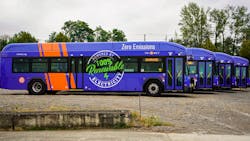TriMet Board approves agency’s first bulk purchase of all-electric buses
TriMet’s Board of Directors approved climate actions to reduce TriMet’s greenhouse gas emissions, move the agency forward on the road to a clean-energy bus fleet and help make the region’s air cleaner.
The board passed two resolutions to initiate TriMet’s first bulk purchase of battery-electric buses and expand the use of renewable diesel in the diesel transit service vehicles.
Zero-emissions milestone for TriMet’s bus fleet
With the board’s support, TriMet will purchase 24 long-range battery electric, zero-emission buses from California-based bus manufacturer GILLIG. The cost is estimated at $26.7 million dollars and represents the largest investment in electric bus technology to date. This is a critical milestone to transitioning to a zero-emissions bus fleet by 2040. The buses in this first bulk purchase of all-electric buses will be long-range buses, with the aim to travel between 150 and 200 miles on a single charge. They will begin arriving in fall 2023.
“Transitioning away from diesel completely will take time as electric and other zero-emission sources continue evolving, but now is the time to invest in this emerging technology,” said TriMet General Manager Sam Desue Jr. “As transit is a vital part of the solution to climate change, this will keep TriMet on the forefront of new advances to improve the air we breathe here in the Portland region.”
TriMet has been testing electric buses since early 2019. It is testing five short-range electric buses from New Flyer, five long-range electric buses from GILLIG and four diesel-to-electric converted buses, including what is believed to be the world’s first 60-foot, articulated bus converted to 100 percent electric.
Renewable diesel fuels more TriMet vehicles
With the board’s authorization, TriMet will contract with Bretthauer Oil Company for the mobile fueling of LIFT paratransit and WES commuter rail vehicles using renewable diesel. This contract is estimated at $15.1 million over five years, beginning May 2022. It comes five months after TriMet switched to renewable diesel for fixed-route buses. Unlike the renewable diesel that is delivered for fixed-route buses and stored in underground tanks, the fuel for LIFT vehicles and WES trains is put directly into the vehicles themselves from the delivery vehicles.
TriMet is using a blend of 99 percent renewable diesel and one percent petroleum, known as R99. While renewable diesel is chemically identical to petroleum, it comes with environmental and operational benefits. Not only does it contain nearly no fossil carbon, it also performs better in cold weather. And because the fuel is derived primarily from fats, greases and other naturally reoccurring organic matter, there is far less reliance on refined petroleum.
Nearly 70 percent reduction in TriMet’s greenhouse gas emissions
The move to renewable diesel in fixed-route buses, and now LIFT vehicles and WES trains, combined with the shift to renewable electricity in June 2021 for MAX trains and all TriMet-owned facilities, reduces TriMet’s greenhouse gas emissions by nearly 70 percent. While the long-term plan is to cut TriMet’s emissions down to net zero by 2050, these actions have an immediate impact for riders and the environment. With these climate actions, TriMet estimates it will avoid more than 193 million pounds of greenhouse gas emissions each year. That is equivalent to taking almost 19,000 automobiles off the road, according to the Environmental Protection Agency.



